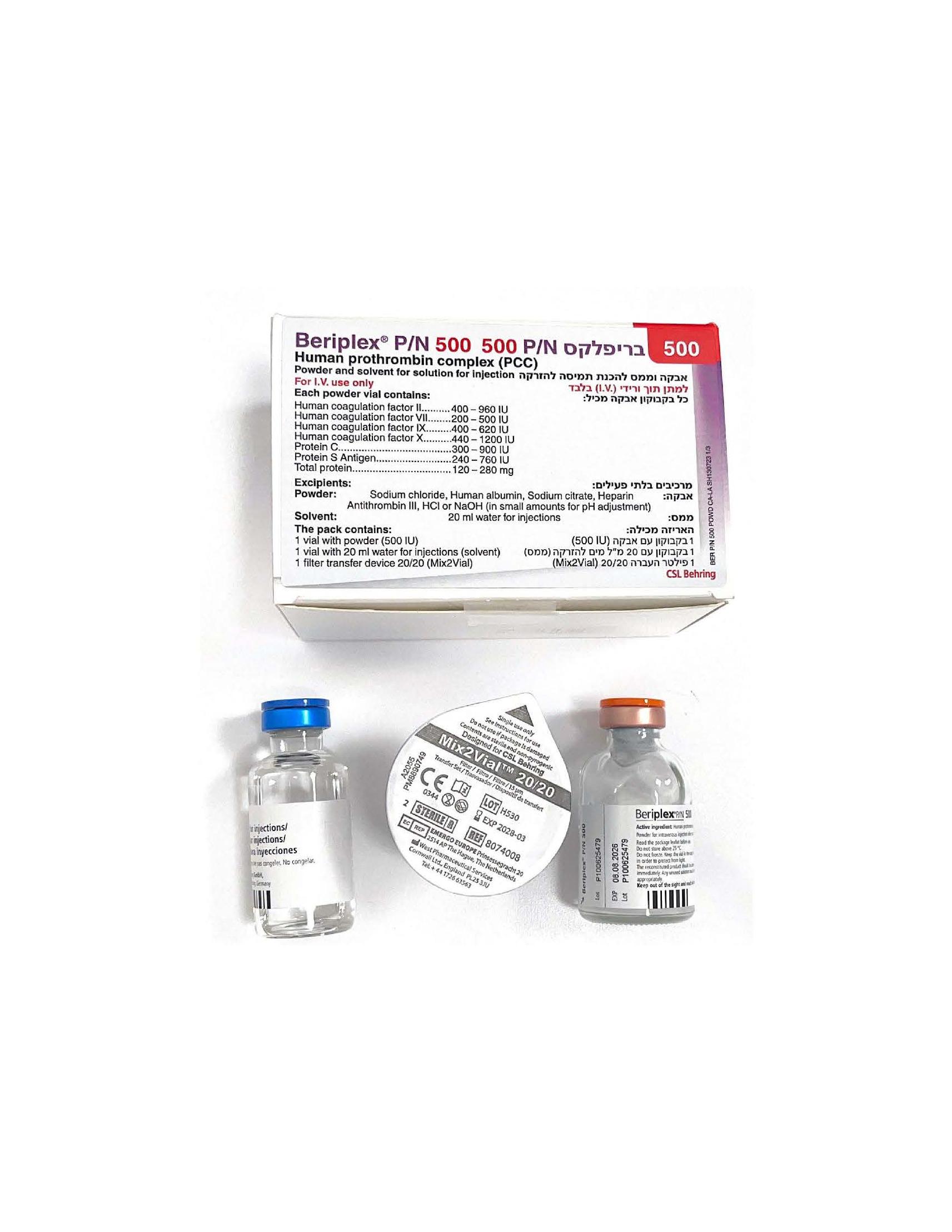Quest for the right Drug

בריפלקס P/N 500 BERIPLEX ® P/N 500 (COAGULATION FACTOR II (HUMAN), COAGULATION FACTOR IX (HUMAN), COAGULATION FACTOR IX (HUMAN- RFIXFC), COAGULATION FACTOR VII (HUMAN), COAGULATION FACTOR X (HUMAN), PROTEIN C, PROTEIN S ANTIGEN)
תרופה במרשם
תרופה בסל
נרקוטיקה
ציטוטוקסיקה
צורת מתן:
תוך-ורידי : I.V
צורת מינון:
אבקה וממס להכנת תמיסה להזרקה : POWDER AND SOLVENT FOR SOLUTION FOR INJECTION
עלון לרופא
מינוניםPosology התוויות
Indications תופעות לוואי
Adverse reactions התוויות נגד
Contraindications אינטראקציות
Interactions מינון יתר
Overdose הריון/הנקה
Pregnancy & Lactation אוכלוסיות מיוחדות
Special populations תכונות פרמקולוגיות
Pharmacological properties מידע רוקחי
Pharmaceutical particulars אזהרת שימוש
Special Warning עלון לרופא
Physicians Leaflet
Special Warning : אזהרת שימוש
4.4 Special warnings and precautions for use The advice of a specialist experienced in the management of coagulation disorders should be sought. In patients with acquired deficiency of the vitamin K-dependent coagulation factors (e.g. as induced by treatment of vitamin K antagonists), Beriplex should only be used when rapid correction of the prothrombin complex levels is necessary, such as major bleedings or emergency surgery. In other cases, reduction of the dose of the vitamin K antagonist and/or administration of vitamin K is usually sufficient. Patients receiving a vitamin K antagonist may have an underlying hypercoaguable state and infusion of human prothrombin complex may exacerbate this. If allergic or anaphylactic-type reactions occur, the administration of Beriplex has to be stopped immediately (e.g. discontinue injection) and an appropriate treatment has to be initiated. Therapeutic measures depend on the kind and severity of the undesirable effect. The current medical standards for shock treatment are to be observed. There is a risk of thrombosis or disseminated intravascular coagulation when patients, with either congenital or acquired deficiency, are treated with human prothrombin complex particularly with repeated dosing. The risk may be higher in treatment of isolated factor VII deficiency, since the other vitamin K-dependent coagulation factors, with longer half-lives, may accumulate to levels considerably higher than normal. Patients given human prothrombin complex should be observed closely for signs or symptoms of disseminated intravascular coagulation or thrombosis. Because of the risk of thromboembolic complications, close monitoring should be exercised when administering Beriplex to patients with a history of coronary heart disease or myocardial infarction, to patients with liver disease, to patients per- or postoperatively, to neonates or to patients at risk of thromboembolic phenomena or disseminated intravascular coagulation or simultaneous inhibitor deficiency. In each of these situations, the potential benefit of treatment with Beriplex should be weighed against the potential risk of such complications. In patients with disseminated intravascular coagulation, it may, under certain circumstances, be necessary to substitute the coagulation factors of the prothrombin complex. This substitution may, however, only be carried out after termination of the consumptive state (e.g. by treatment of the underlying cause, persistent normalization of the antithrombin III level). Reversing vitamin K antagonists exposes patients to the thromboembolic risk of the underlying disease. Resumption of anticoagulation should be carefully considered as soon as possible. Undesirable reactions may include the development of heparin-induced thrombocytopenia, type II (HIT, type II). Characteristic signs of HIT are a platelet count drop > 50 per cent and/or the occurrence of new or unexplained thromboembolic complications during heparin therapy. Onset is typically from 4 to 14 days after initiation of heparin therapy but may occur within 10 hours in patients recently exposed to heparin (within the previous 100 days). No data are available regarding the use of Beriplex in case of perinatal bleeding due to vitamin K deficiency in neonates. Beriplex contains up to 343 mg sodium (approximately 15 mmol) per 100 ml. To be taken into consideration by patients on a controlled sodium diet. Virus safety Standard measures to prevent infections resulting from the use of medicinal products prepared from human blood or plasma include selection of donors, screening of individual donations and plasma pools for specific markers of infection and the inclusion of effective manufacturing steps for the inactivation/removal of viruses. Despite this, when medicinal products prepared from human blood or plasma are administered, the possibility of transmitting infective agents cannot be totally excluded. This also applies to unknown or emerging viruses and other pathogens. The measures taken are considered effective for enveloped viruses such as human immunodeficiency virus (HIV), hepatitis B virus (HBV) and hepatitis C virus (HCV) and for the non-enveloped hepatitis A and parvovirus B19 viruses. Appropriate vaccination (hepatitis A and B) should be considered for patients in regular/repeated receipt of human plasma-derived prothrombin complex products. It is strongly recommended that every time that Beriplex is administered to a patient, the name and batch number of the product are recorded in order to maintain a link between the patient and the batch of the product.
Effects on Driving
4.7 Effects on ability to drive and use machines No studies on the effects on the ability to drive and use machines have been performed.

שימוש לפי פנקס קופ''ח כללית 1994
לא צוין
תאריך הכללה מקורי בסל
לא צוין
הגבלות
לא צוין
מידע נוסף
